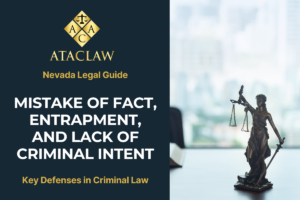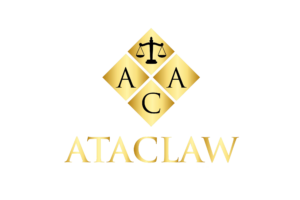Mistake of Fact, Entrapment, and Lack of Criminal Intent: Key Defenses in Criminal Law
In the intricate landscape of criminal law, the defenses of mistake of fact, entrapment, and lack of criminal intent stand out as vital instruments that can pivot the direction of a case. These defenses, when successfully argued, have the power to mitigate, or in some instances, completely absolve the accused from criminal liability. This article delves into each of these defenses, exploring their elements, legal requirements, and real-life applications through case studies.
Mistake of Fact Defense
The mistake of fact defense operates under the premise that a person’s incorrect belief about a fact led them to commit an act that otherwise would not have been undertaken. This defense is predicated on the absence of mens rea, or the “guilty mind,” required for a crime.
For example, if a person takes someone else’s property believing it to be theirs, they may use the mistake of fact defense to argue that their genuine belief negated the intent to steal. However, this defense requires the belief to be reasonable under the circumstances, distinguishing it from mere ignorance of the law, which is typically not a defense.
Case studies such as the acquittal of individuals charged with receiving stolen goods, when they can convincingly demonstrate their belief that the goods were legitimately acquired, underscore the effectiveness of the mistake of fact defense. These instances highlight the necessity for the defense to convincingly establish the accused’s state of mind at the time of the alleged crime.
Entrapment Defense
Entrapment occurs when law enforcement officials induce a person to commit a crime that they would not have otherwise committed. The defense of entrapment contends that the government’s deception overcomes the will of an individual, making their subsequent criminal act more a product of manipulation than of their own volition.
Understanding entrapment necessitates distinguishing between merely providing an opportunity to commit a crime and inducing the commission of the crime. Legal requirements for entrapment often hinge on proving that the idea and intent to commit the crime originated with the officials, not with the accused.
Notable cases of successful entrapment defenses often involve undercover operations where the accused can demonstrate that they were not predisposed to commit the crime until persuaded by law enforcement. These cases serve as critical discussions on the limits of lawful law enforcement conduct and the protection of individual rights against coercive tactics.
Lack of Criminal Intent Defense
Lack of criminal intent as a defense argues that the accused did not possess the mental state required to be held liable for a crime. This defense acknowledges that while the accused might have committed the actus reus or the physical act of the crime, they lacked the mens rea, or criminal intent, necessary for conviction.
Exploring this defense involves examining the specific intent required by the statute under which the accused is charged. For example, in crimes requiring specific intent to harm, proving that the accused acted without such intent can lead to acquittal.
Real-life examples where this defense has been successfully employed often involve complex scenarios where the accused’s mental state at the time of the offense is thoroughly examined. Cases of involuntary intoxication or actions undertaken under duress are instances where the lack of criminal intent defense might be effectively applied, emphasizing the importance of the defendant’s mental state in criminal liability.
Conclusion: Importance of Understanding Criminal Law Defenses
The defenses of mistake of fact, entrapment, and lack of criminal intent are indispensable components of the criminal law landscape. They serve not only as safeguards for the accused but also as mechanisms that uphold the integrity of the legal system by ensuring that guilt is accurately determined. Understanding these defenses, their applications, and their limitations is crucial for both legal practitioners and the public to navigate the complexities of criminal law and justice. Through the exploration of case studies and legal principles, it becomes evident that these defenses play a pivotal role in shaping the outcomes of criminal cases, underscoring the nuanced nature of legal defense strategies in the pursuit of justice.
Do you need a Self Defense Attorney in Las Vegas?
If You're Facing Charges, We're Here To Help.
 Call us for help
Call us for help
"How do you beat a self defense charge in Nevada?"
"When is use of force permitted for self defense?"
What self defense weapons are legal in Las Vegas?
If you needed use of force during an act of self defense, and are now facing charges:
We have answers for you
To learn more about self defense charges in Las Vegas and how to get your self defense charge dismissed or to discuss a particular criminal case that you or someone you love is facing, Call ATAC Law firm for help to get your charges reduced or dismissed.
Contact us for a FREE phone meeting to discuss your case with what people are calling the best criminal defense attorney in Las Vegas.
At ATAC, our Las Vegas team of lawyers is here to work with you to help you through your case.
For Nevada Revised Statutes (NRS) related to legal matters, including sex crimes, fraud charges, DUI charges, domestic violence, and non-homicide self-defense, you can visit the official website of the Nevada Legislature or consult legal databases specific to the state. These resources will provide you with the most up-to-date and accurate information on the relevant statutes.
- Nevada Legislature Website: You can visit the official website of the Nevada Legislature at leg.state.nv.us. The website usually has an easy-to-navigate interface where you can search for specific NRS codes related to different legal categories.
- Legal Databases: Online legal databases such as Nevada Legal Forms or Justia may also provide access to the latest Nevada Revised Statutes.
- Legal Professionals: If you have specific legal questions or need assistance with legal codes, consulting with a legal professional, such as an attorney practicing in Nevada, is always a good idea.


